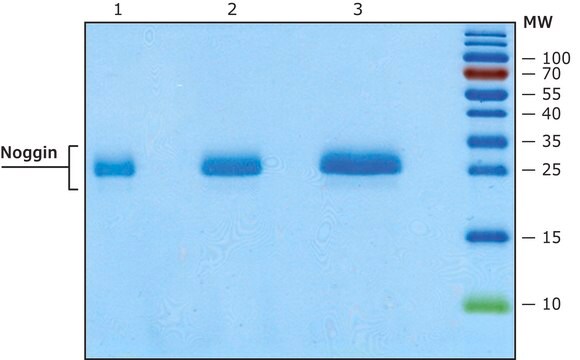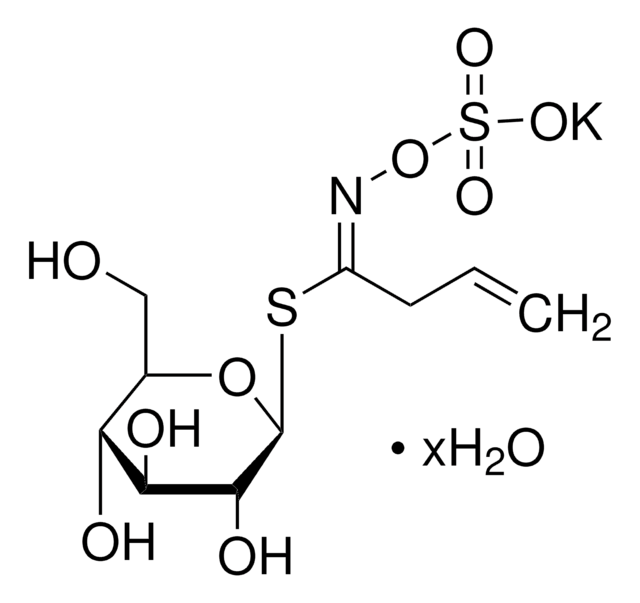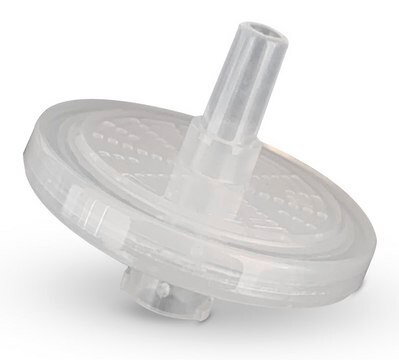S7800
CPGWIZ™ p16 - Methylation specific PCR assay
Iniciar sesiónpara Ver la Fijación de precios por contrato y de la organización
About This Item
UNSPSC Code:
12161503
eCl@ss:
32161000
NACRES:
NA.84
Productos recomendados
General description
FUNCTION: SwissProt: Q8N726 # Capable of inducing cell cycle arrest in G1 and G2 phases. Acts as a tumor suppressor. Binds to MDM2 and blocks its nucleocytoplasmic shuttling by sequestering it in the nucleolus. This inhibits the oncogenic action of MDM2 by blocking MDM2- induced degradation of p53 and enhancing p53-dependent transactivation and apoptosis. Also induces G2 arrest and apoptosis in a p53-independent manner by preventing the activation of cyclin B1/CDC2 complexes. Binds to BCL6 and down-regulates BCL6-induced transcriptional repression. Binds to E2F1 and MYC and blocks their transcriptional activator activity but has no effect on MYC transcriptional repression. Binds to TOP1/TOPOI and stimulates its activity. This complex binds to rRNA gene promoters and may play a role in rRNA transcription and/or maturation. Interacts with NPM1/B23 and promotes its polyubiquitination and degradation, thus inhibiting rRNA processing. Interacts with UBE2I/UBC9 and enhances sumoylation of a number of its binding partners including MDM2 and E2F1. Binds to HUWE1 and represses its ubiquitin ligase activity. May play a role in controlling cell proliferation and apoptosis during mammary gland development.| P42771 # Acts as a negative regulator of the proliferation of normal cells by interacting strongly with CDK4 and CDK6. This inhibits their ability to interact with cyclins D and to phosphorylate the retinoblastoma protein.
SIZE: 173 amino acids; 18006 Da
SUBUNIT: Does not interact with cyclins, CDC2, CDK2, CDK4, CDK5 or CDK6. Binds to BCL6, E2F1, HUWE1, MDM2, MYC, NPM1/B23, TOP1/TOPOI and UBE2I/UBC9. Interacts with TBRG1.
SUBCELLULAR LOCATION: Nucleus, nucleolus (By similarity).
DISEASE: SwissProt: P42771 # Defects in CDKN2A are involved in tumor formation in a wide range of tissues. & Defects in CDKN2A are the cause of cutaneous malignant melanoma 2 (CMM2) [MIM:155601]. Inheritance is autosomal dominant. Malignant melanoma is a malignant neoplasm of melanocytes, arising de novo or from a preexisting benign nevus, which occurs most often in the skin but also may involve other sites. & Defects in CDKN2A are the cause of familial atypical multiple mole melanoma-pancreatic carcinoma syndrome (FAMMMPC) [MIM:606719]. & Defects in CDKN2A are a cause of Li-Fraumeni syndrome (LFS) [MIM:151623]. LFS is a highly penetrant familial cancer phenotype usually associated with inherited mutations in TP53. & Defects in CDKN2A are the cause of melanoma-astrocytoma syndrome [MIM:155755]. The melanoma-astrocytoma syndrome is characterized by a dual predisposition to melanoma and neural system tumors, commonly astrocytoma.
SIMILARITY: SwissProt: P42771 ## Belongs to the CDKN2 cyclin-dependent kinase inhibitor family. & Contains 4 ANK repeats.
SIZE: 173 amino acids; 18006 Da
SUBUNIT: Does not interact with cyclins, CDC2, CDK2, CDK4, CDK5 or CDK6. Binds to BCL6, E2F1, HUWE1, MDM2, MYC, NPM1/B23, TOP1/TOPOI and UBE2I/UBC9. Interacts with TBRG1.
SUBCELLULAR LOCATION: Nucleus, nucleolus (By similarity).
DISEASE: SwissProt: P42771 # Defects in CDKN2A are involved in tumor formation in a wide range of tissues. & Defects in CDKN2A are the cause of cutaneous malignant melanoma 2 (CMM2) [MIM:155601]. Inheritance is autosomal dominant. Malignant melanoma is a malignant neoplasm of melanocytes, arising de novo or from a preexisting benign nevus, which occurs most often in the skin but also may involve other sites. & Defects in CDKN2A are the cause of familial atypical multiple mole melanoma-pancreatic carcinoma syndrome (FAMMMPC) [MIM:606719]. & Defects in CDKN2A are a cause of Li-Fraumeni syndrome (LFS) [MIM:151623]. LFS is a highly penetrant familial cancer phenotype usually associated with inherited mutations in TP53. & Defects in CDKN2A are the cause of melanoma-astrocytoma syndrome [MIM:155755]. The melanoma-astrocytoma syndrome is characterized by a dual predisposition to melanoma and neural system tumors, commonly astrocytoma.
SIMILARITY: SwissProt: P42771 ## Belongs to the CDKN2 cyclin-dependent kinase inhibitor family. & Contains 4 ANK repeats.
Application
Principles of the Technique
Use of either the CpGenome DNA Modification Kit (Cat. No. S7820) or the CpGenome Fast DNA Modification Kit (Cat. No. S7824) facilitates the initial bisulfite reactions, while the TM=["CPGWIZ"] p16 Amplification Kit contains the reagents required for the gene-specific PCR amplification reactions.
Use of either the CpGenome DNA Modification Kit (Cat. No. S7820) or the CpGenome Fast DNA Modification Kit (Cat. No. S7824) facilitates the initial bisulfite reactions, while the TM=["CPGWIZ"] p16 Amplification Kit contains the reagents required for the gene-specific PCR amplification reactions.
Legal Information
CPGWIZ is a trademark of Merck KGaA, Darmstadt, Germany
Disclaimer
Unless otherwise stated in our catalog or other company documentation accompanying the product(s), our products are intended for research use only and are not to be used for any other purpose, which includes but is not limited to, unauthorized commercial uses, in vitro diagnostic uses, ex vivo or in vivo therapeutic uses or any type of consumption or application to humans or animals.
Storage Class
10 - Combustible liquids
Certificados de análisis (COA)
Busque Certificados de análisis (COA) introduciendo el número de lote del producto. Los números de lote se encuentran en la etiqueta del producto después de las palabras «Lot» o «Batch»
¿Ya tiene este producto?
Encuentre la documentación para los productos que ha comprado recientemente en la Biblioteca de documentos.
Nuestro equipo de científicos tiene experiencia en todas las áreas de investigación: Ciencias de la vida, Ciencia de los materiales, Síntesis química, Cromatografía, Analítica y muchas otras.
Póngase en contacto con el Servicio técnico






